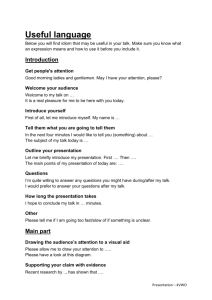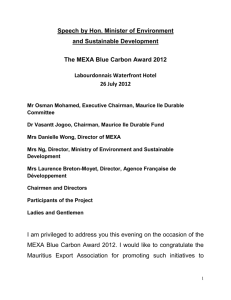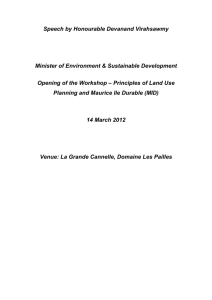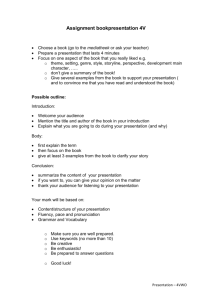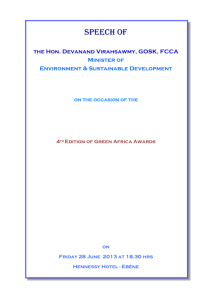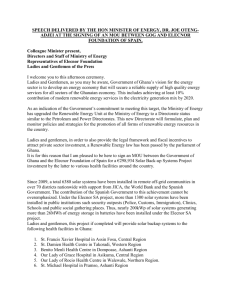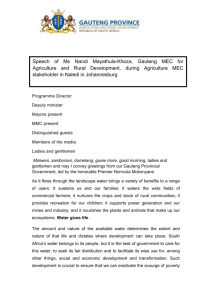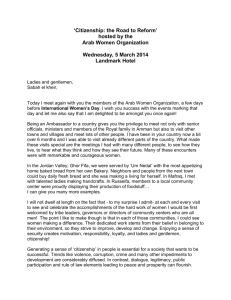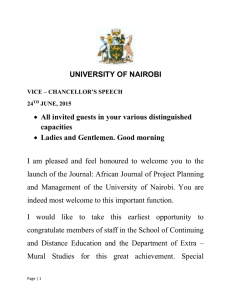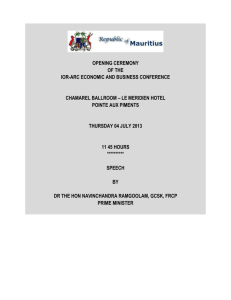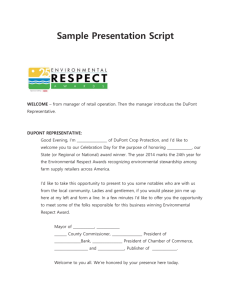12.02.13 Validation Workshop for the Rio
advertisement
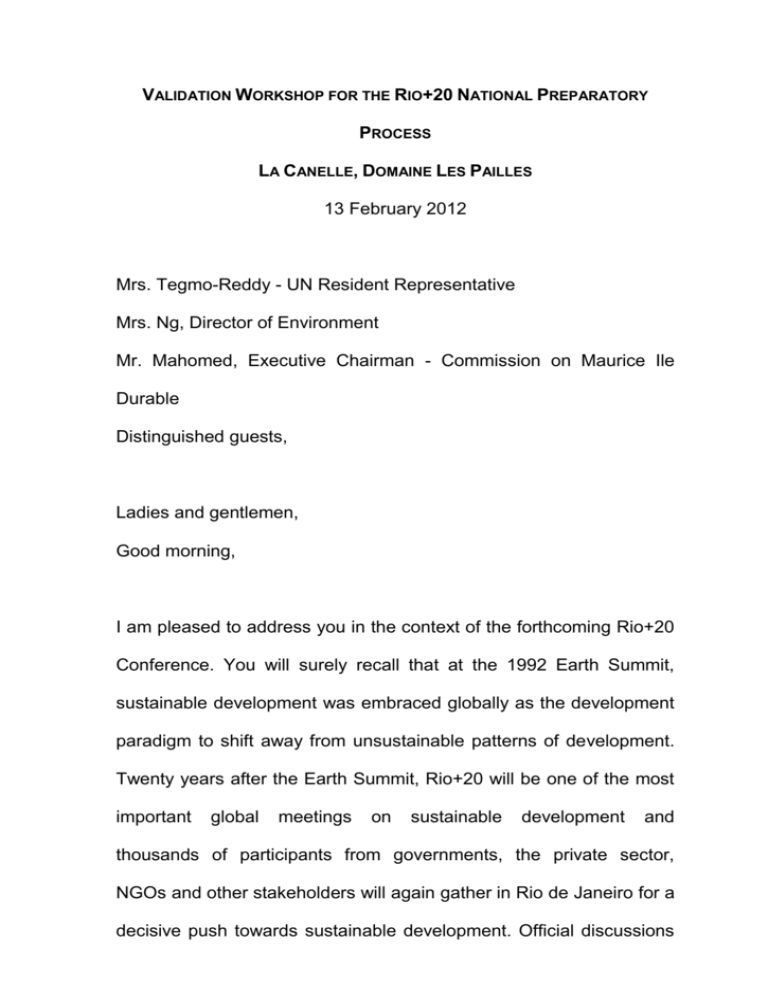
VALIDATION WORKSHOP FOR THE RIO+20 NATIONAL PREPARATORY PROCESS LA CANELLE, DOMAINE LES PAILLES 13 February 2012 Mrs. Tegmo-Reddy - UN Resident Representative Mrs. Ng, Director of Environment Mr. Mahomed, Executive Chairman - Commission on Maurice Ile Durable Distinguished guests, Ladies and gentlemen, Good morning, I am pleased to address you in the context of the forthcoming Rio+20 Conference. You will surely recall that at the 1992 Earth Summit, sustainable development was embraced globally as the development paradigm to shift away from unsustainable patterns of development. Twenty years after the Earth Summit, Rio+20 will be one of the most important global meetings on sustainable development and thousands of participants from governments, the private sector, NGOs and other stakeholders will again gather in Rio de Janeiro for a decisive push towards sustainable development. Official discussions for Rio+20 will focus on two main themes: How to build a green economy to achieve sustainable development and lift people out of poverty and how to improve coordination to make sustainable development happen. I firmly believe that Rio+20 will provide a new and historic opportunity to define pathways to a safer, more equitable, cleaner, greener and more prosperous world. Let us come back to today’s workshop. The overall objective of this exercise is two-fold. First: participants will have the opportunity to take stock of progress achieved in advancing sustainable development at national level. They will also take cognizance of the constraints and challenges that are likely to affect the country’s progress in its quest for sustainability. Second: the most important intent is to arrive at a consensus on Mauritius’ key sustainable development concerns and priorities. Today, you will be called upon to formulate a set of action-oriented recommendations to transform Mauritius into a green economy. These recommendations will be enunciated during plenary sessions in Rio de Janeiro and will serve as an essential roadmap to tread towards sustainable development after the Rio+20 Conference. Ladies and Gentlemen, This Government has already embraced sustainable development and the green economy concept. Allow me therefore to highlight on some initiatives taken recently. Provisions made during previous budgets have given the right impetus towards the greening of Mauritius. We have indeed reshaped policies and redirected investments and spending in this direction. These include: The setting up of the MID Fund to support sustainable development initiatives. Already some Rs. 500 million rupees have been spent in the implementation of 19 projects that aim at improving energy efficiency and promoting the use of renewable energy. Following the 2012 budget, Rs. 250 million have been earmarked to implement the second phase of the solar water heaters scheme and Rs. 100 million for new projects on energy efficiency, renewable energy, composting, biofuels and sensitisation among others. Development and implementation of a National Framework on Sustainable Consumption and Production, comprising 44 projects. Development of a sustainable public procurement policy, and Promotion of sustainable buildings and energy efficiency are but a few examples of our transition towards a green economy. Ladies and Gentlemen, In addition to strong political will and leadership, the path towards sustainable development and green growth requires the right enabling environment. It is critical to have proper sustainable development policies, implementable strategies and practical action plans in place. A proper management framework is imperative to ensure success in the pursuit of sustainability. In this context, I am pleased to announce that consultants have already been appointed and the formulation of the MID Policy, Strategy and Action Plan has already started. The consultants will also review the existing institutional and legislative framework and develop indicators for monitoring and evaluating progress in sustainable development. We are expecting the final MID Policy, Strategy and Action Plan to be ready by end of July 2012. It is of utmost importance for Ministries and relevant stakeholders to ensure that their strategies and priority programmes are taken on board. I therefore urge all of you to contribute actively and fully to make this endeavour a success. Ladies and Gentlemen, As we embark in making Maurice Ile Durable a reality, there is an urgent need to change mindsets and transform lifestyles. In this vein, the National Programme on Sustainable Consumption and Production developed by my Ministry is being currently reviewed in the light of lessons learnt and experience gained during the implementation process. I am pleased to say that the review will propose solutions to existing constraints and identify fresh opportunities, projects and best practices to enhance the National SCP Programme. Moreover, I would like to underscore that moving towards a sustainable mode of production and consumption is also dependent on the role and contribution of all partners, especially the industrial sector and the business community as a whole. Indeed, sustainable consumption and production is of significant importance to industries as it entails resource use efficiency, integrated waste management and improving supply and demand of sustainable products and services. It is therefore imperative that enterprises make extensive use of green technologies, understand the importance of sustainable consumption and production and the benefits derived from green practices. Towards this end, Government is putting in place a National Cleaner Production Centre. Ladies and Gentlemen, As we strive to move towards sustainable development, we should not lose sight of the global climate challenge. In this regard, government has put climate change mitigation and adaptation high on its agenda. I would like to seize this opportunity to share with you some of the initiatives taken by my Ministry to increase our climate resilience and adaptive capacity. We are currently mainstreaming climate change adaptation into our institutional framework and core development policies, sectoral strategies and plans through the Africa Adaptation Programme. Key sectors include: disaster risk reduction and management, environment, water, agriculture, fisheries, tourism and education among others. A Technology Needs Assessment project on mitigation and adaptation to climate change is also under implementation. This will enable us bridge the gap between the identification of appropriate technologies and the design of action plans so as to reduce greenhouse gas emissions. My Ministry has also benefited $9 million US dollars from the Adaptation Fund Board under the Kyoto Protocol to undertake a climate change adaptation programme in some of our most vulnerable coastal areas, namely: Mon Choisy, Rivière des Galets, Quatre Soeurs and Deux Frères. Other components of this programme comprise the enhancement of Early Warning System to address incoming storm surges, training and capacity building, policy mainstreaming, knowledge dissemination and management. To reduce dependency on imported fossil fuels, Government has set a target of achieving 35% renewable energy by 2025 and has set a clear roadmap in the Long Term Energy Strategy 2009 – 2025. We are also investing massively in the setting up of micro-hydro units and wind parks in Mauritius and Rodrigues as well as encouraging households to produce electricity from renewable sources and sell it to the grid. To further protect fragile ecosystems, we have elaborated two major frameworks for the integrated management of our coastal zone and all Environmentally Sensitive Areas. Recommendations made to that effect are presently under implementation. The updated National Environmental Strategies aiming at maintaining high standards of environmental health and quality of life are also under implementation. The priority projects focus on integrated air quality management, industrial pollution prevention, environmental education and awareness among others. To green procurement practices across the public sector, Government has decided to integrate sustainable criteria in the purchase of goods and services so as to minimize environmental damage and maximize social benefits. The following seven products and services are being targeted: paper and printing, IT devices, cleaning products and services, office and classroom furniture, vehicles, food and catering services and construction work. We expect the Private Sector to follow suit. Ladies and Gentlemen, Government is leaving no stone unturned in its quest for sustainable development. While we are actively engaged in making Maurice Ile Durable happen, we also want to be showcased as a sustainable development model, especially for Small Island Developing States. I therefore make an appeal that we pool our resources together to come up with a solid set of recommendations. I am therefore relying on your full support and collaboration for today’s mission. I am pleased to announce that the theme for Independence Day, on the 12th of March will be “Maurice Nou L’Ile Durable” I wish you all fruitful deliberations and thank you for your attention.
